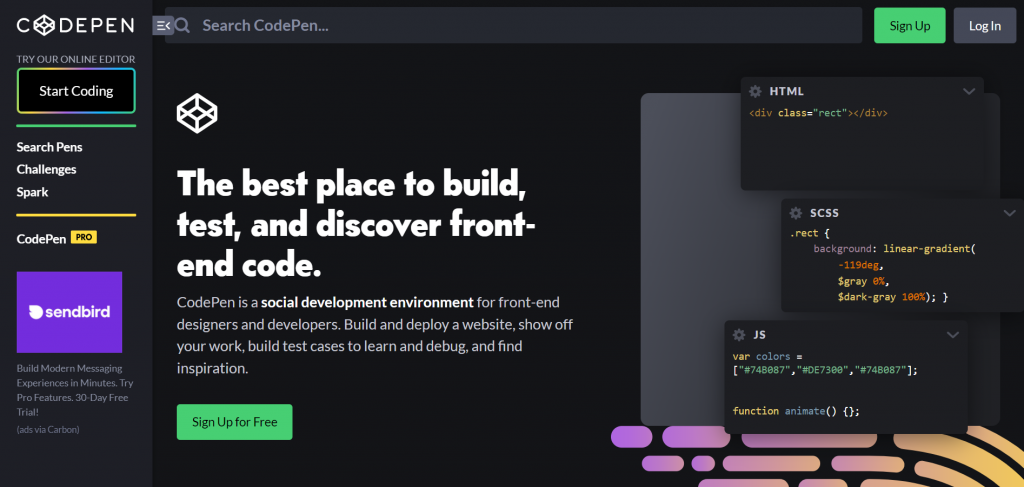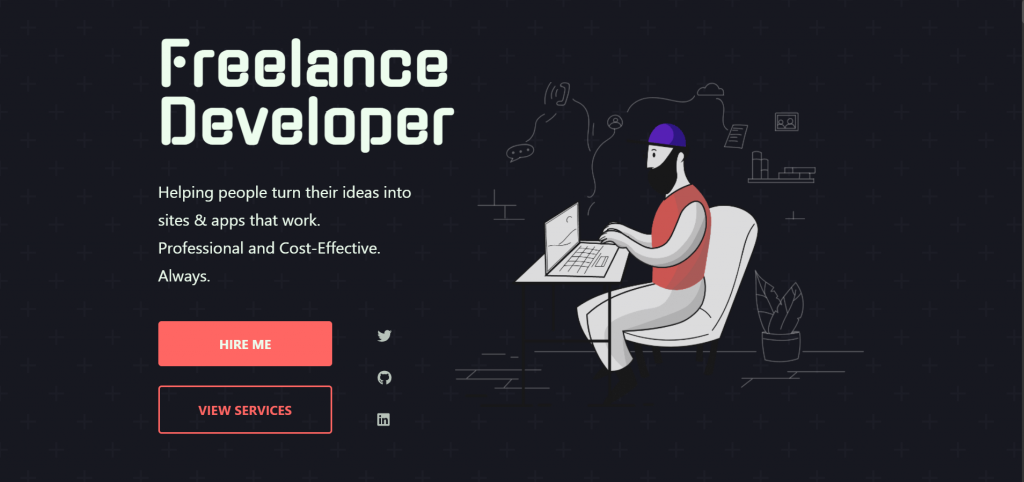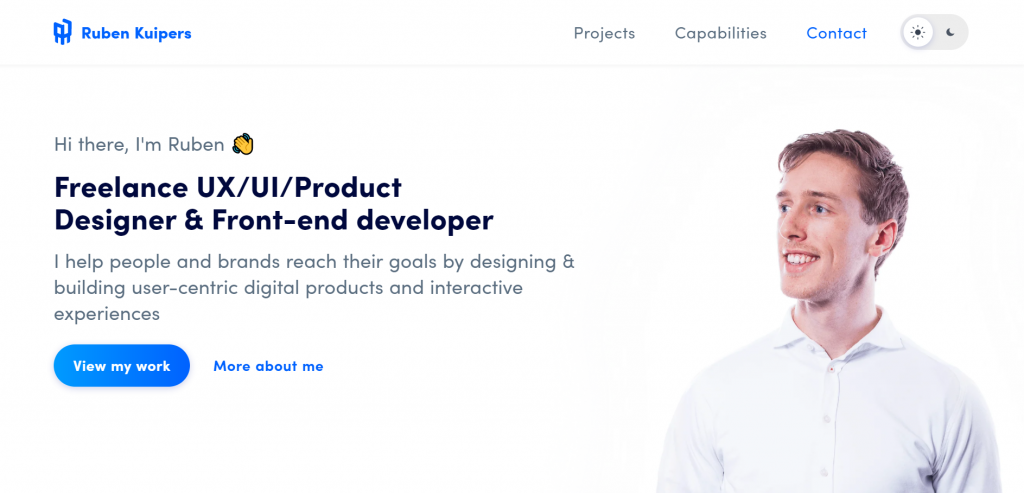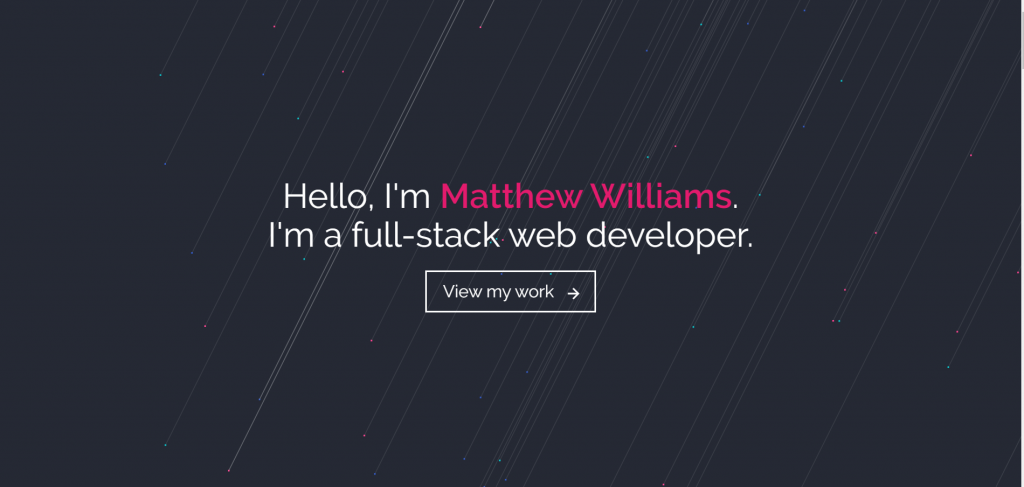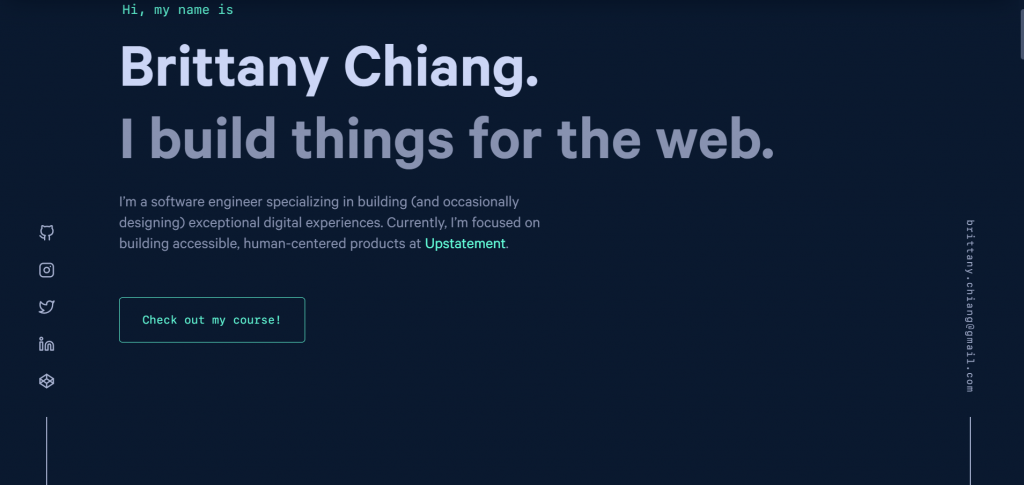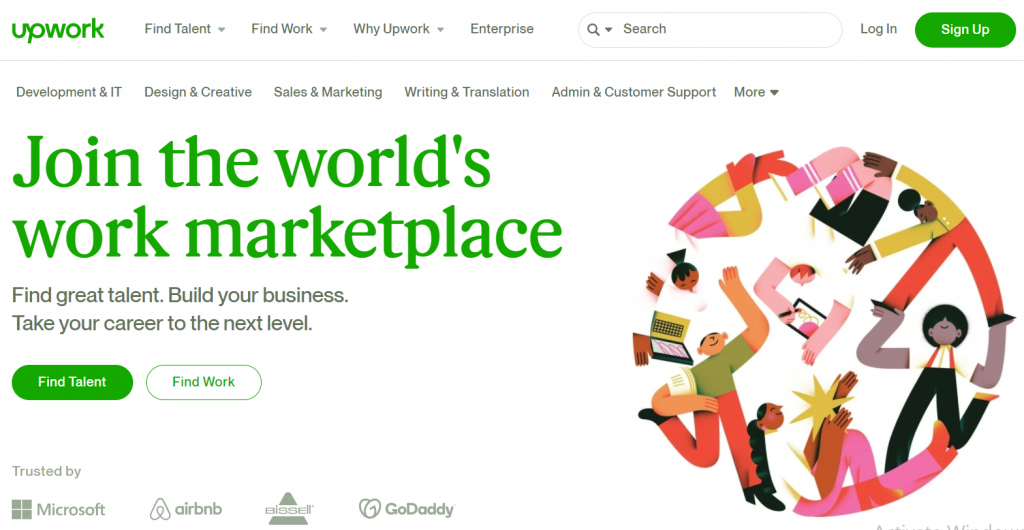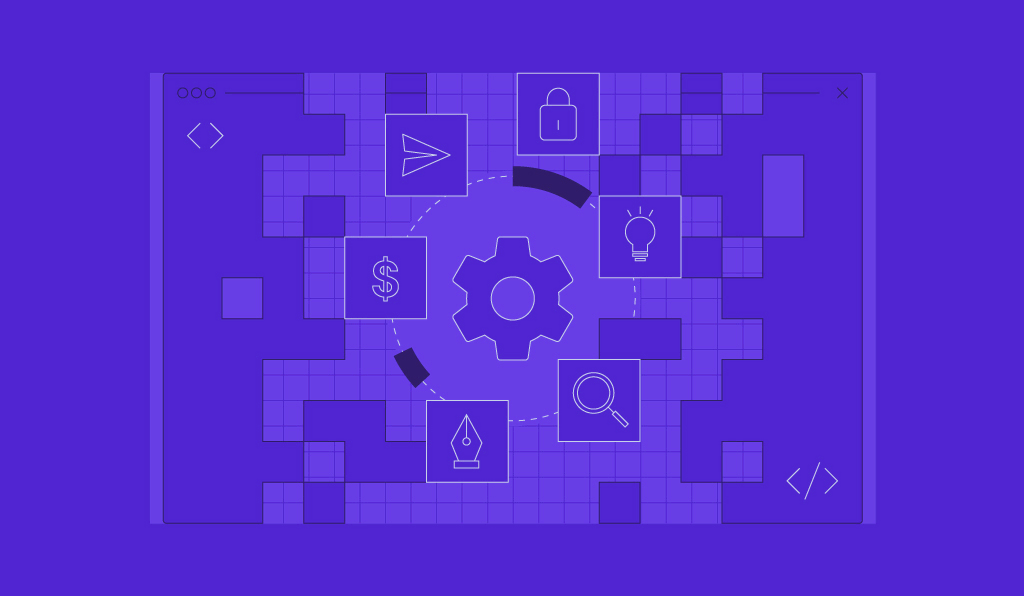Freelance Web Developer: How to Start Your Career in 2024

As a result of the growing trend of remote working, it is easy to understand the increased popularity of freelancing as a career choice.
People can pursue a freelance job in all kinds of industries including web development. One study found that the vast majority of web developers see an annual business growth of 25% or more. With this in mind, it is easy to see why this profession is one of the ten most in-demand tech jobs in 2021.
Furthermore, as more businesses migrate online, it is a priority to create a well-developed website. This is why top web developers are so sought-after nowadays.
However, hiring a full-time web developer can be expensive. Hence, many business owners find scouting for freelance talent preferable, especially for one-off projects.
In this guide, we’ll go over what you need to know to jumpstart your web development career and provide some tips to find success as a freelancer.
What Is a Freelance Web Developer
A freelance web developer is employed independently and can work from home, coffee shops, or libraries – essentially, anywhere with an internet connection. They are responsible for delivering the end product after discussing their ideas with a client.
Working as a freelance web developer will allow you to tackle various projects from different employers, both local and global. Since you get to manage your own business, you can determine your rates, work schedule, and even be selective about which clients you want to work with.
Freelance developers typically offer services such as creating software with programming languages, designing websites, managing complex data, and ensuring a website is compatible with different browsers and devices.
How to Become a Freelance Web Developer
A web developer must possess both technical ability and design sensibility. The former involves being able to construct a functional website, while the latter is about making a visually pleasing and user-friendly website design.
Let’s take a look at seven tips to help you start freelancing:
1. Decide the Type of Web Development to Focus On
The first step is to determine what kind of services you can offer as a freelance developer. The web development sector is classified into three areas of expertise:
Front-End Development
Front-end web developers are responsible for ensuring that visitors have a great user experience. Essentially, this type of web development means ensuring your client’s website’s look and feel are up to their preferences and expectations. Consider the website’s aesthetic factors, but also its overall user interface’s efficiency.
Combined with programming skills, front-end developers develop UI elements such as buttons and icons, choose colors, pictures, or typography. This means that you are in charge of enriching every visible and clickable aspect of a web design.
To be a front-end web developer, you need to have extensive knowledge of HTML, CSS, and JavaScript. Apart from mastering these three primary programming languages, you must also be familiar with relevant search engine optimization (SEO) strategies.
Pro Tip
Take a look at our HTML Cheat Sheet and CSS Cheat Sheetto improve your coding skills!
Back-End Development
Focusing on the back-end of web development means that you will primarily deal with tasks that involve the creation of the site’s core, databases, APIs, and other server-side activities. In other words, backend developers handle the logical side of a website’s infrastructure that powers the front-end.
Among many other core programming languages, back-end web developers must be well-versed in PHP, MySQL, Python, and frameworks associated with your preferred language.
For example, you can choose Laravel, Phalcon, or CodeIgniter among other popular PHP frameworks to build web applications.
In addition to staying on top of technical advancements in the coding and programming field, backend developers should also develop solid soft skills such as good communication and teamwork. It is because effective communication with front-end developers is required to ensure a fully functional site.
Full-Stack Development
Full-stack development essentially combines the knowledge and skills of both front-end and back-end development. You must be equally adept at building a website’s user interface and managing its functions on the server. In other words, a full-stack developer must have the full capacity to handle everything related to web development.
2. Useful Skills for Freelance Web Developers
Aside from programming languages and technical knowledge, it is a good idea to learn other skills that can help you deliver excellent services to clients. Below are several additional skills that can further improve your credibility as a freelance web developer:
Technical Skills
As a freelance web developer, technical skills greatly reflect your competence and make you a more versatile talent. This can give you an advantage over your competitors.
- Responsive design. For web developers, understanding responsive design is a must. It’s crucial to build websites that can be viewed on both computers and mobile devices, no matter the size.
- Testing and debugging. A web developer must ensure a fully functional website and mobile app. Website testing helps check aspects such as user-friendliness, efficiency, and user satisfaction and reveals any errors that require debugging.
- Back-end knowledge. Even if you are solely focused on the front-end, it’s still essential to firmly grasp back-end development. Ensure that you know the fundamentals of servers, databases, and cybersecurity.
- Search engine optimization. When it comes to SEO, a website’s usability is equally as important as its content. Web developers are responsible for making a site mobile-friendly, implementing easy navigation, keeping page load times low, and adding a sitemap. All of these are site ranking factors.
- Micro copywriting. Some clients may hire freelance copywriters to create copy for their websites. However, micro-content is required for web pages, landing pages, or software elements. Having a solid command of grammar and compelling writing will help with the creation of reliable content.
Soft Skills
Soft skills indicate your ability to collaborate with others. As a freelance web developer, you need them to build a good relationship with clients. Soft skills further help you efficiently achieve an understanding of your clients’ needs and expectations.
- Analytical skills. A website’s functionality depends on how web developers structure its code. Having an analytical mind will help identify and fix any potential issues.
- Interpersonal skills. Since freelancers typically work alone, having strong people skills will help execute your client demands and convey your ideas clearly. Being a good listener and communicator will prevent misunderstandings from occurring.
- Excellent work ethic. A strong work ethic is one of the most sought-after qualities that clients look for in freelancers. To maintain a good reputation and the loyalty of clients, display a strong sense of reliability, discipline, and professionalism.
Business skills
Lastly, having solid business skills also adds value to your service. Just like running any business, you need to implement strategies to earn a consistent stream of income. Market your services effectively, build a solid personal brand, set the right prices, expand your network, and learn negotiation skills.
3. Gain Work Experience to Build Your Name
Before you embark on your freelance web development journey, you need to gain experience. Experience will help hone your coding skills and fill up your portfolio, leading to acquiring more clients as a freelance developer. Moreover, it will also give you an idea of what kind of web development projects suit your skills best and how to tackle difficulties.
Taking on volunteer work is the simplest way to gain experience. For instance, you can make a simple website for local businesses or a personal website for your friends.
Even though it’s all pro-bono, this way you’ll build your portfolio, spread the word about your talents, and ultimately convince future clients to hire you. Ultimately, it can become the crucial first step in scaling your freelance business in the long run.
For more extensive experience, here are some other project ideas that you can work on:
- Create a new website with a CMS. Creating a website using a content management system (CMS) can be a simple project for beginners or anyone wanting to showcase their design skills. CMS platforms such as WordPress, Joomla, and Drupal allow you to virtually design any website without having to write any code. Furthermore, this freelance web development project idea can be done for a minimal cost.
- Redesign or improve an existing website. Since outdated or unattractive website designs can negatively impact a customer’s experience, it means that there’s always room for improvement. Search for clients that may benefit from a website makeover. As an example for your redesign project, find a business that needs its website to become responsive on all devices.
- Create a landing page. A landing page is the first thing visitors see after clicking on a web advertisement or search result. As a freelance web developer, creating an effective landing page can help enhance your client’s business’s credibility, improve user experience, and ultimately drive more sales. Consider using a landing page builder to get your web page live the same day.
- Build a website for small businesses. All types of enterprises require platforms to demonstrate their products or services on. However, many small business owners lack the resources and expertise to build a quality website. This is where you come in. As a freelance web developer, you can help a client by creating a fantastic and easy-to-navigate website design.
- Take on projects requiring different programming languages. To thrive as a successful freelance web developer, you should master a wide range of coding skills and programming languages. Once you have extensive web development expertise, you will likely come by more work opportunities. In addition, this will allow you to work on diverse projects, which will ultimately increase your experience and boost your income.
- Contribute to open-source projects. Collaborate with fellow freelancers to work on open-source projects. Doing so can be excellent to sharpen your coding skills and network with other freelancers. Use GitHub to find relevant open-source projects that interest you.
In addition, CodePen is another platform for web developers to collaborate and share ideas. It features an online code editor for all developers to hone their skills. The platform encourages learning to code and focuses on front-end languages.
4. Set Up Your Freelancing Business
Being a freelancer means that you work independently. Thus, you’ll need a business plan to succeed.
An ideal business plan should cover all key aspects of operations and guide you in the right direction to meet your professional goals. It is essential to determine the mission of your business and set a vision to help you reach your target income, estimate any expenses, and choose projects.
Moreover, it is helpful to have a different bank account that is strictly for your freelance business. This will help facilitate the calculation of taxes, revenue, and expenses.
5. Take Care of the Legal Obligations
Depending on where you reside, there may be certain legal requirements or regulations surrounding freelance workers. Since freelancers are not considered regular employees or business owners, you may need to register your activities with the government.
Ask local law firms what you need to do if you are unsure whether registration is necessary. Alternatively, you can hire an accountant to guide you through all the local laws and specific guidelines on freelance work. They can help calculate your annual taxes and manage expenses and deductions.
Furthermore, remember to consider how you’ll protect your freelance business. It will be a lot simpler if you work with clients using a third-party platform that manages projects and payments for you.
If you prefer to work directly with your clients, ensure that you have an official agreement in place that describes how much money they owe you for the work done.
Insurance is another important legal obligation you’ll have to take care of as a freelance web developer. If you get sued by a client, having insurance may protect you against potential financial losses.
Check out the different types of freelance insurance available. Typically, liability insurance protects freelancers against claims made by clients regarding poor performance or breaches of contract.
6. Build a Portfolio Website
A portfolio website is a great platform to showcase your past work and build your personal brand. It is a personal project that allows you the creative freedom to experiment.
If you design your portfolio thoughtfully and creatively, visitors will be able to see a reflection of your web development skills. Furthermore, a combination of stunning visuals and engaging content will help convince potential clients to use your services.
On your portfolio website, include projects that you have worked on. Along with testimonials, this will establish a trustworthy first impression. In addition, be sure to talk about your education, web developer certifications, skill set, and experience as a way to let people see your personality.
Since the whole point of your portfolio is attracting new clients, ensure that you are reachable. Put your availability schedules, email address, social media profiles, and contact form in visible spots on your website.
Here’s what you’ll need to build a web developer portfolio website:
- Website-building platform. A portfolio maker offers a simple solution to create a portfolio website from scratch. If you are looking for a platform that allows greater customization and content management flexibility, we recommend a CMS like WordPress.
- Domain name. Your domain name is what people type into the address bar on their browsers. When picking a domain name for your portfolio website, strive for uniqueness and professionalism. Therefore, opt for .com or .dev domain and be sure to check its availability using a domain name search.
- Web hosting. You’ll need a web hosting account to store your portfolio website and make it available to the public. Since a web developer’s portfolio website typically contains many media files, choose a plan that provides sufficient storage.
Here at Hostinger, we offer multiple hosting solutions. Our Premium and Business shared hosting plans include free domains, email accounts, and SSL certificates. Starting at £2.59/month, it’s an ideal fit for hosting sites like your freelance web developer portfolio website.

Once you pick a platform, set up a domain name and web hosting, it’s time to build your portfolio. Keep your website design simple and adhere to best practices when creating it. Remember to include elements that convey your personality, desired projects, and capabilities as a freelance web developer.
To inspire you, let’s take a look at the following expert web developer portfolio websites.
Adham’s homepage features an eye-catching graphic that demonstrates his coding and design skills. This portfolio exemplifies elegant design and meticulous attention to detail. Moreover, there’s also a section where he presents case studies of his past projects. It is a fascinating way to guide visitors through the journey of his web design career.
Ray van den Berg is the man behind From The Mountain. He develops web and mobile apps. His homepage displays what he does with an illustration of a freelance developer sitting in front of a laptop. The website’s navigation is simple and allows users to contact him or view his services without having to scroll down.
When you visit Ruben’s website, you immediately know what he looks like and what he does. This gives a sense of familiarity and trust to any prospective clients. Furthermore, it is a great example of a one-page portfolio web design that is free of clutter.
With a black background, Matthew’s homepage looks attractive and clean. On the landing page, you will see his brief self-introduction as a web developer. As you scroll down, the page loads different sections that contain information such as his skills, blogs, portfolio, and contact information.
Brittany is another professional web developer that uses a one-page portfolio website. She employs a dark color scheme and simplicity in her website design. The sticky header helps users navigate her site easily.
Gift’s portfolio web design uses only a few animations and colors, which makes it look simple yet elegant. Furthermore, the ability to toggle between light and dark themes makes her portfolio website stand out. Click on the tiny moon icon at the upper right corner of her site to do so.
Suggested Reading
Read our article on how to write a web developer resume to further improve your chance of getting a web development gig.
7. Market Your Services
After completing the previous steps, it’s time to market your services. Marketing can be challenging as you will need to put yourself out there by actively networking with other people and business owners.
Hence, along with creating a functional and stunning portfolio website, it is essential to promote your services in an effective way.
Being a freelance web developer provides you with a plethora of marketing channels. Instead of trying to market everywhere at once, try to focus on one marketing channel before implementing other marketing methods.
Below are some of the most popular mediums to market your services.
- Referrals. Attracting more customers through word-of-mouth or referral marketing is still an excellent approach to market your business. You’ll establish authority when you receive new projects from people that know you through existing clients or acquaintances in the industry. Be professional when asking your clients for referrals.
- Content marketing. Creating niche-specific content is an excellent method to establish your expertise and generate leads. Write blog posts or publish video content as part of your content marketing strategy. Ultimately, adopting the right practices can result in more lucrative contracts.
- Website. Your website should employ the best SEO techniques to perform better on search engine results pages. A higher rank increases the likelihood of more users clicking, driving more organic traffic to your website and boosting your online visibility.
- Social media. Attract more clients by spreading the word about your services on social media platforms such as Facebook, Instagram, or LinkedIn. In addition, you can create a YouTube channel to share anything related to your job as a freelance web developer.
- Offline events. Attending events such as conventions, seminars, or webinars where you can meet potential clients is an effective way of getting noticed. It allows you to introduce yourself to other professional web developers, which can open doors to opportunities. Furthermore, it can also expand your knowledge and skills.
- Community or forums. An online community or forum can be another medium to market your services with. Get involved in a platform where you can engage in discussions with other freelance professionals. Go on LinkedIn, Quora, or Reddit to answer questions related to web development topics. Doing so will provide you with networking opportunities with both fellow freelancers and prospective clients.
Stack Overflow is another excellent forum for web developers to share their knowledge and learn from others. Developers of varying skill levels will ask and answer any questions you have regarding web development.
Where to Find Freelance Web Developer Jobs
When looking for work, you may want to start by signing up on freelance platforms. There you can find many job listings for web development services in one place.
New platforms are popping up to streamline the freelancer-client relationship. They also make it easier for you to narrow down your job searches. You can filter job options based on your skills and activate job alerts for projects that match your preferences.
The following are some of the most popular sites to find work:
This freelance platform allows developers to set their own rates based on their experience. However, the talent contests are what sets this website apart from its competitors. Freelancers compete with one and another by promoting their top skills and setting great prices. These contests frequently determine hiring decisions.
Additionally, you can send 15 proposals to clients, browse jobs, and receive notifications for new openings without signing up for a subscription plan.
Guru simplifies the process of searching for jobs and submitting quotes to clients. After creating your profile, the platform will recommend jobs based on your skill level and previous experience.
On Guru, freelancers can bid on either long or short-term projects and charge a flat rate for each. To withdraw your earnings, you can use PayPal or a wire transfer. Moreover, the platform protects its freelancers with SafePay to ensure timely payments.
Toptal hosts a broad network of experienced and accomplished freelancers.
The vetting process that a freelancer needs to go through when applying to Toptal involves five steps. Applicants have to pass a comprehensive English evaluation and perform a test project. The test measures a freelancer’s expertise, professionalism, and communication skills.
The platform only accepts fewer than 3% of the thousands of applications it receives each month. If you pass the screening process, you’ll gain access to numerous job postings from high-profile clients such as HP Enterprise, Motorola, and Bridgestone. On the other hand, if you fail the test, your application will be put on hold for months.
On Upwork, clients will determine your qualifications by checking your profile when you apply for a job or project. Be sure to set up a detailed Upwork profile with information about yourself, your skills, and your job history.
Freelancers on this platform can choose to work on short-term, ongoing, individual, or team-based projects. If you’re just starting as a freelancer, Upwork can be the ideal project-hunting platform.
This platform is designed for freelancers to promote themselves based on their level of expertise. It allows freelancers to decide the price they want to set for their services, starting at the low price of $5. Freelancers with a lot of positive reviews and high ratings tend to command prices of up to $100/hour or more if their work offers great value.
How Much Does a Freelance Web Developer Earn?
A report shows that the average yearly web developer salary for a US-based freelance is $72,208, which equates to approximately $35/hour. Generally, back-end and full-stack developers earn more than front-end developers.
It is important to consider various aspects before pricing your services. Take into account your level of expertise, past work experience, location as well as the project’s complexity.
If you are unsure how much to charge for your services, consider the following approaches:
- Penetration pricing. If you lack expertise or experience, use this pricing option to set lower rates than other freelancers in your niche.
- Time-based pricing. For new freelancers, this is the simplest strategy for pricing their services. You can ask to be paid hourly or daily, depending on the project requirements. With this tactic, the more hours you work, the more you’ll earn.
- Project-based pricing. With this method, your client agrees to a budget you set before starting the work. Hence, estimating the required time and effort for project completion is essential for this strategy. Bear in mind to review the project description to avoid working extra hours.
- Promotional pricing. Use this pricing tactic to break into the freelance market if you are not ready to ask for premium or project-based rates. It will give your clients the impression of paying for your services at a special price.
Alternatively, reach out to your network of freelancer friends to ask for a ballpark figure. If you don’t know any, research online. You can find a variety of pricing and pitching approaches shared by other freelancers on online communities, forums, or personal blogs.
Freelance Web Developer Pros and Cons
Let us now go into the essential aspects of being a freelance web developer, examining both the advantages and disadvantages of this dynamic career path.
Pros of Being a Freelance Web Developer
If your definition of an ideal job is to be your own boss, then freelancing will be perfect for you. Here are some pros that come along with working as a freelance web developer:
- Flexible working hours and locations. A major perk of being a freelance web developer is the ability to work at any time. You also have the option to work either from a coffee shop, a coworking space, or home. Essentially, any location with an internet connection can serve as your workplace.
- Freedom to select your projects. Freelancing lets you choose projects and clients based on your preferences. You are not obligated to accept a project from clients that you are uncomfortable working with.
- Project autonomy. Apart from selecting projects that are a good fit for your talents and interests, freelancing lets you control the flow and direction of your activities. Moreover, working as a freelance web developer allows you to pursue other individual or open-source projects.
- Financial control. As a freelancer, you have complete control over your rates and project quotes. This gives you the ability to earn what you’re worth and manage your income.
Cons of Being a Freelance Web Developer
However, there are also a few cons of being a freelance web developer, such as:
- Financial Instability. When you work as a freelancer, there’s no certainty when your next paycheck will come. Freelancing does not guarantee long-term financial stability. You may earn less or more than your previous project.
- Busy schedule. Working alone can be extremely challenging at times. At some point, you’ll have to keep track of a lot of things, such as meeting deadlines, writing proposals, and maintaining a website.
- Competitive industry. When you first begin your freelance career, you may find it difficult to stand out from the crowd. Many other web developers offer the same services as you. Many companies prefer to work with reputable freelance web developers with outstanding portfolios.
Being a freelance web developer has several benefits and drawbacks. However, no job comes easy. The most important thing is to know how to deal with the challenges at hand.
Tips for Becoming a Successful Freelance Web Developer
To succeed as a freelance web developer, apply the following tips:
Specialize in a Niche
As a freelance web developer, you must establish yourself as the best in your field. This will strengthen your portfolio by allowing you to highlight your specialty and credibility. It’s possible to do a little bit of everything, so you may feel compelled to take on any job to earn more money online.
However, focusing on a specific niche will make it easier to gain expertise and establish a reputation. As a result, you’ll be able to specialize in a few areas in which you excel and narrow down your services. Furthermore, your target market will begin to associate you with your niche, leading to more clients.
Narrowing down your niche can take some time and effort. Here are some tips to help you decide on a niche easier:
- Choose a niche based on your past work. Look back at the projects you’ve already completed to get a sense of what you like to do. You may already be focusing on a specific type of web development project without even realizing it.
If you’ve already worked in a particular niche before, you’ll have a better idea of its demand for developers and financial viability. Moreover, your past clients will be able to give referrals and present you with other opportunities to generate new prospects. - Analyze your competitors. Conduct market research within the industry of freelance web developers. Doing so will help determine if your desired niche is viable. Find the answer by browsing around freelance marketplaces. There, you’ll be able to easily see how many people are looking to hire web developers for specific tasks.
- Consider things that pique your interests. Choosing a niche that interests you will make it easier to remain intrigued. You’ll be able to delve deeper into its challenges, peculiarities, and latest trends. Consider compiling a list of things you feel enthusiastic about and researching how they relate to web development.
Combining your passions and web development expertise can differentiate you from the competition. Potential clients may feel more inclined to hire you because of your uniqueness.
Keep Up With Web Development Trends
Trends can come in handy to help market your services to established businesses, especially the ones that are interested in adopting new strategies and advanced technology to sell their products. Staying on top of the latest web development practices will enable you to develop great websites with a touch of freshness and modernity.
Continue improving your skills by learning new languages and technologies in web development in your free time. You can also subscribe to newsletters and publications related to your sector as a way to keep up with emerging trends.
Read articles, blogs, and tutorials to expand your knowledge about web development. By doing so, you will be able to better keep up with the constant changes. This will also make it easier for prospective clients to recognize just how much expertise you have under your belt.
Offer Hosting Maintenance Services
Clients may come to you to create a website for them without having a domain name or web hosting in place. Even though it can feel like extra work, you’ll earn more by offering hosting maintenance and domain management services.
Many clients may not have enough resources to build, maintain, and constantly improve their websites. It can be costly to hire other web developers to work on them full-time. By selling website maintenance services, you can help them out while still getting paid.
In addition, clients will be more likely to hire you if you offer the complete package of web development. Let them know that your services include website backups, security updates, traffic monitoring, speed optimization, and domain renewal.
Purchase a VPS hosting plan to host multiple client’s websites on a single account. Not only will this save you money when compared to purchasing a separate package for each client, but it will also streamline your website-monitoring process.
Alternatively, opt for one of the Hostinger Pro plans, the managed services and scalable web hosting for professional projects.
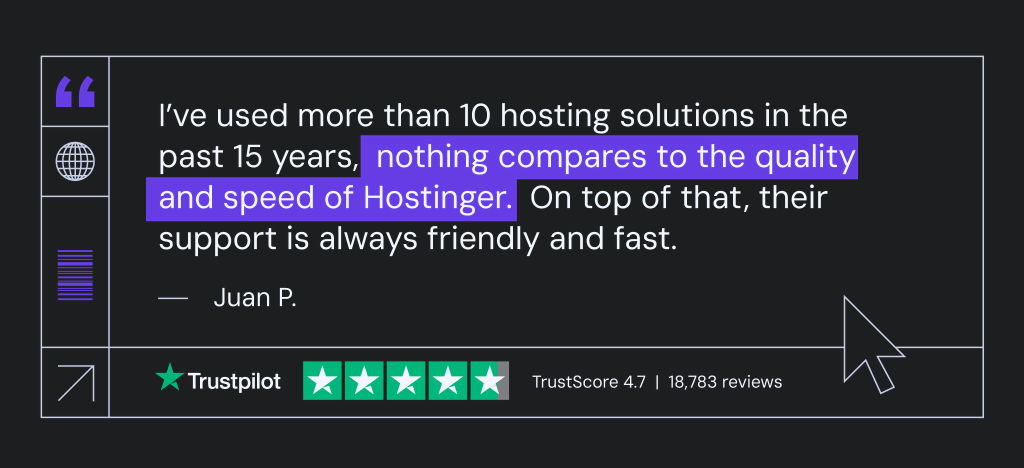
Invest in Business Management Tools
Investing in a business management tool will help manage several clients and projects at the same time. This way, you’ll be able to streamline your process of setting targets, managing projects, and meeting deadlines.
Time-Tracking Tools
Monitoring time spent on your daily tasks and projects is more manageable with time-tracking apps. They let you evaluate the accuracy of your time estimates and the efficiency of your abilities as a freelance web developer.
Tracking your time will help you become more aware of each task’s progress, resulting in increased productivity. Using the data collected by the tools, you can conduct self-studies to see if your time management skills help you reach your objectives.
Enhance your time management skills with the following tools:
- Toggl. It offers an easy-to-use application for monitoring how much time you spend on a project. Additionally, the tool features advanced features such as automated timesheet management and report emailing. It’s a great app for freelancers, agencies, and teams.
- Clockify. Free for unlimited time and users, Clockify is the perfect choice for freelancers. It keeps accurate time reports and provides visual analysis. In addition, it is integrated with a variety of project management applications such as GitHub, ClickUp, and Trello.
- TopTracker. TopTal’s time tracker offers a complete freelancer-friendly solution. It is free and without limitations for all features. Users can benefit from timed screenshots, free invoicing, and full privacy profile configurations. In addition, the tool provides comprehensive reporting of your time.
Invoicing Tools
As a freelancer, you deserve to get paid accurately and on time. Creating invoices for several projects and clients can be challenging, especially if you aren’t familiar with the process. This is where invoicing tools come in.
Invoicing tools allow freelancers to specify a preset billable amount for each project. They simplify the process of verifying invoices and eliminate the possibility of errors. Additionally, you can share the invoice with your clients without having to manually calculate work hours.
The following tools can help you invoice clients in an easy, secure, and seamless manner:
- Invoice Simple. With this tool, users can quickly and easily submit estimates to clients. It is ideal for freelancers who are looking for simple yet professional invoicing software. Furthermore, it allows tracking your invoices with an Android or iOS app.
- Akaunting. Invoicing, tracking expenses, and managing all of your accounting needs can be done using this free web tool. Since it’s open-source, you can download and host the software on your web server. What’s more, it offers full data privacy.
- Wave. A great invoicing tool for freelancers looking to simplify and handle invoicing essentials. It allows users to create personalized and unlimited invoices in any currency. Additionally, it comes with configurable payment terms, accepts bank and credit card payments, and generates automatic payment reminders for your clients.
Project Management Tools
Your typical workday as a freelance web developer is likely dynamic. At some point, you may be required to work on many projects concurrently while submitting invoices and sending out proposals for new projects on schedule.
The primary role of project management tools is to keep track of accomplished, current, and upcoming projects. If you have clear information on the current status of your projects, project planning will become much easier to manage.
To organize your work in a systematic order and be more efficient, choose from the following popular project management tools:
- Monday.com. Users can plan, track, and organize their projects. It is an excellent project management tool that allows you to create project plans using fully customizable templates.
- Todoist. It is a simple task management application to organize your workflow. The tool allows you to set a work schedule and see its overview in real-time. It analyzes your to-do list and sets priorities for the most important tasks.
- Any.do. It comes with a daily planner to organize your tasks, lists, and reminders in one place. Any.do Moment can quickly assess your daily tasks by determining what needs to be worked on, rescheduled, or removed after completion. Moreover, it features smart reminders with visually appealing themes.
Maintain a Work-Life Balance
Maintaining a healthy balance between your professional and personal life is very important. By doing so, you’ll alleviate psychological stress and pressure, preventing burnout.
When formulating a good work-life balance, remember that what works for one freelancer may not work for you. Therefore, try to understand yourself better. Strive to prioritize your mental and physical well-being and take the time to reflect on your capabilities and limits.
Here are some tips for you to create an optimal work-life balance:
- Establish a consistent work schedule. Having the freedom to be your own boss is a perk of working as a freelance web developer. However, ensure that you’re self-disciplined when it comes to work. Setting fixed working hours will support an efficient and stress-free work environment.
- Create a work plan. As a freelancer, you are likely to find yourself managing many projects while trying to secure new clients simultaneously. Hence, it is essential to plan your work beforehand. A good schedule will help ensure timely project deliveries, which is vital for maintaining your reputation.
- Take frequent breaks. Remember to take small breaks as you work. Sitting for hours may cause issues with concentration. Taking some time to relax will help you think clearly and prepare for the upcoming tasks better.
- Define your availability. Having flexible working hours does not mean 24/7 availability. Some clients may assume that they can call you at any time. Make sure that they know your work hours. Additionally, consider having a separate phone number for your business.
- Focus on your health. Stress and bad posture can seriously harm your health. Adopt a healthy lifestyle that involves getting enough sleep, exercising regularly, and eating right to stay fit.
- Learn when to decline a project. Remember that you have limitations. Learn to say no to a project if your hands are already full. Think about what you need to work on and whether you have the resources to take on another job.
- Prepare your week in advance. Avoid becoming overworked by setting aside some time to plan your week and manage your calendar. Create a daily to-do list that includes your business engagements and personal needs. The list will help you manage your time and adhere to a scheduled routine.
Conclusion
Freelancing as a full-time job enables you to execute any projects with complete creative control. This modern work style allows you to be selective about the projects you take on. That said, becoming a successful freelance web developer doesn’t happen overnight. It takes a lot of time and effort.
No matter the type of web development you specialize in, you must possess a blend of technical, soft, and business skills. These qualities will substantially raise the profitability of your services as a freelance web developer. The more diverse your skills, the more likely it is that clients will choose you.
To find freelance web development projects, look up job listings online and offline such as through WordPress development agencies. You’ll increase your chances by signing up on freelancing websites for developers and reaching out to local businesses and acquaintances.
We hope this tutorial has been helpful. By following the steps and tips in this article, you’ll be on your way to begin a successful career as a freelance web developer. Good luck finding your first project.
